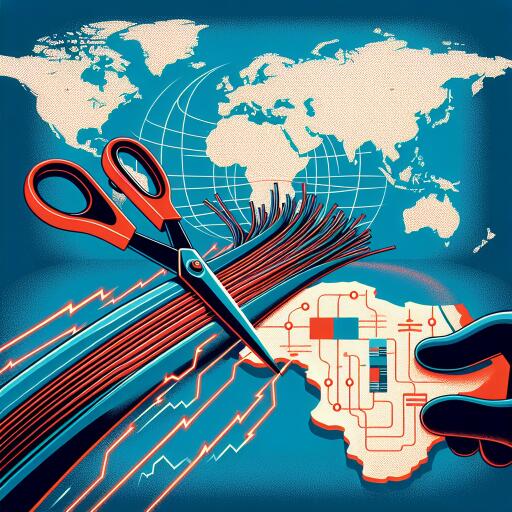Widespread Internet Disruption Hits Multiple African Nations
On Thursday, a significant disruption in internet services swept across numerous African countries, markedly affecting business operations and communication channels. This widespread disturbance, attributed to multiple failures in submarine internet cables, left a considerable part of West, Central, and South Africa grappling with slow or completely unresponsive internet services.
The countries most profoundly impacted include Nigeria, Ghana, Guinea, Cameroon, Ivory Coast, Liberia, and Gambia. South Africans also faced considerable challenges, reporting sluggish internet speeds and intermittent access. Experts have identified failures in several key submarine cables as the culprits behind these disruptions. Among these cables, AAE1 and EIG were notable for their critical outages, contributing to the extensive service interruptions experienced across the African continent.
Detailed analytics provided by internet technology firms have revealed the severity of the situation. Notably, Ivory Coast encountered a severe cut-off from the digital world, while nations like Liberia, Benin, Ghana, and Burkina Faso also suffered significant connectivity losses. This series of disruptions was not isolated to any single region. Instead, they manifested a clear pattern, affecting countries longitudinally from the northern reaches to the southernmost parts of Africa.
Seacom, a leading connectivity provider in South Africa, alerted its customers about an outage affecting the West African Cable System, a crucial link in the submarine network chain. This incident illustrates the vulnerability of extensive digital networks and signifies the potential for widespread impact from single points of failure.
In a related development, MainOne, a predominant internet provider serving numerous Nigerian banks, experienced a critical fibre cut in Ghana. This incident had a domino effect, disrupting banking operations and leaving customers unable to use banking applications or USSD services for transactions. Sterling Bank was amongst the financial institutions compelled to notify their customers about the resultant difficulties in accessing online banking services.
Lemfi, an innovative African remittance startup, was another victim of the outage, facing downtime that affected its operations. This incident underscores the growing reliance on stable internet connections for the continuity of digital services and the significant challenges that arise when these connections are severed.
In response to the widespread disruptions, internet providers and affected companies have been working diligently to reroute traffic through alternative pathways to mitigate the impact on services. Statements from connectivity providers have highlighted efforts to maintain service continuity without congestion, despite the looming threat of further complications should these alternatives fail.
This extensive internet outage serves as a critical reminder of the fragility of global digital infrastructure and the importance of having robust contingency plans to ensure service continuity amidst unforeseen disruptions. As the affected regions continue to recover from this significant digital setback, attention is now turning to measures that can enhance the resilience of internet infrastructure, safeguarding against future vulnerabilities.










